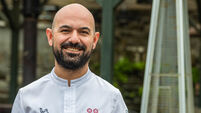The big interview: Darina Allen reflects on 21 years of cookery writing

As Darina Allen marks 21 years of writing for The Irish Examiner, she talks to about her amazing career.
It’s just after lunchtime in Ballymaloe Cookery School. The large, airy dining room is restored to its pre-dining state of calm after a busy student lunch. Darina Allen breezes in, swathed in brushed cotton and wearing her signature jewel coloured glasses. Sitting down at one of the tables, she is handed a glass of coffee.








